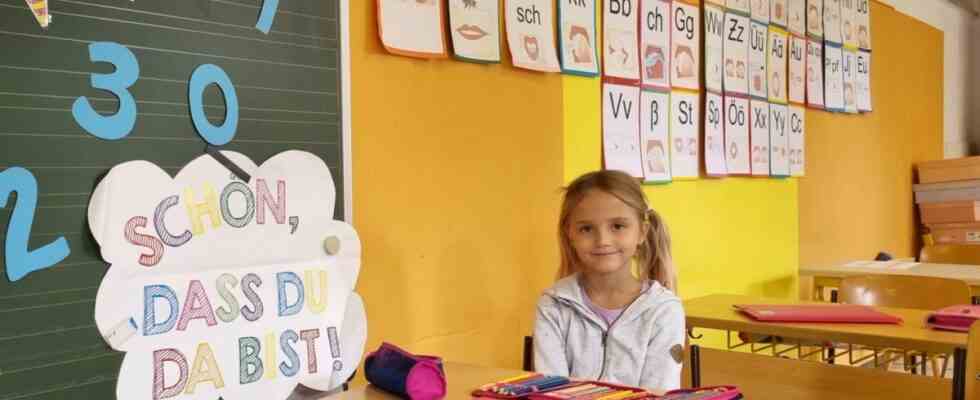The little girl looks a bit lost. “You could say goodbye to your mother here,” says the teacher. She wore a blue scarf and a yellow sweater to go with her jeans. Now she is using her hands and feet to let the little one understand that the stuffed polar bear, the pencil case and the colors in front of her are gifts for her. Parents of the other students gave them to the children for Alona when they started school. On the first day of school, the candy bag is a must. It is usually full to the brim with sweets, crayons, notebooks and toys.
In Ukraine, where Alona comes from, the school year always starts on September 1st. The teachers are also given presents when they start school: the first-graders give them bouquets of flowers and receive a small gift in return. The children in the Ukraine do not know a school cone like in Germany. School enrollment in a foreign country with foreign traditions. Maybe the gifts can make it easier to get started.
Alona was still in kindergarten in Ukraine before she fled
The D1 of the elementary and middle school in Kirchseeon, which Alona will attend, is an integration class. The girl is six years old. She was in kindergarten in the Ukraine for seven months before she came to Germany with her parents in March. Fled from Putin’s war.
Alona speaks Ukrainian and points with her finger: This is my new notebook, this is my pen, this is my teddy bear and these are my colors. In German, she counts the things that were in the school bag until she reaches the number ten. She tries to speak quickly to the translator to express her happiness.
They were warmly welcomed by the residents of Kirchseeon, says their mother, Alina Davydova, and it was the same at school, shortly before eight o’clock that first morning. The teachers, the ladies from the administration, the school board, they were all there. Just not Alona’s father.
He’s injured, still being treated, couldn’t come with us. Just before his daughter’s first day of school, a Russian missile hit the building where he had lived with his family. While Alona’s mother was busy buying school supplies in Kirchseeon, her father was in his hometown of Chuguev near Kharkiv. He had volunteered to bring food and medicine from Kharkiv to the city’s residents.
A rocket hit the second floor of the building
He actually wanted to return to Kirchseeon when school started to support his daughter, but then the Russian rocket came. It struck the second floor of the building, which fell to rubble and ash. All who were in it died. Alona’s father was the sole survivor.
Now he’s back in Kirchseeon with his family, he was lucky, even if they don’t have much space in the apartment. It consists of two rooms, Alona lives with her parents in one, her aunt and son in the other.
Mohamad Ibrahim, who works as a teacher, knows about the conditions in which the refugees live. “Ukrainian children often live in very cramped apartments – they need space, the school gives them space for their development,” he explains. In the Bavarian lessons, says the educator, “the children should now learn the language, develop socially with other children in face-to-face lessons and, above all, be able to develop”. The children absolutely need a psychological break from the war, says Ibrahim. School can offer such a space.
Alina Davydova and her daughter Alona hope for a bit of normality in Kirchseeon.
(Photo: Mohamad Alkhalaf)
Almost 1.7 million schoolchildren have started the new school year in Bavaria, 30,000 of them come from the Ukraine. The integration is a challenge. For all sides.
“When I went to the new school with my daughter for the first time, I was worried,” says Alina Davydova. “How do you think she will talk to the other children and get along?” She herself was incredibly upset about the war. “How much does that carry over to my daughter?”
A few days later, Alona is already looking pretty good. She has new friends in the transition class. Although she doesn’t know their names well, she plays with them in the schoolyard and paints the Ukrainian flag, their old kindergarten and their demolished house with them. And the teacher is also satisfied, a development can already be seen, she reports. Alona logs in to class and no longer just looks shy at the floor. She can express herself with the German numbers she already knows: she uses one to refer to herself, two to her mother and three to her father. Ten stands for her cat “Luntik”. She found them on the street and decided to take care of them, in the war, at home. The cat lived with Alona in the basement for a month until Alona and her family fled. They left the cat with their relatives.
“I miss the cat, the kindergarten and our house,” says Alona. But she is afraid to return to Ukraine, she wishes that her cat would come to Germany and live with her here in the apartment. Alona does not yet know that she will have to leave the apartment with her family next January and that she does not yet have a home.

